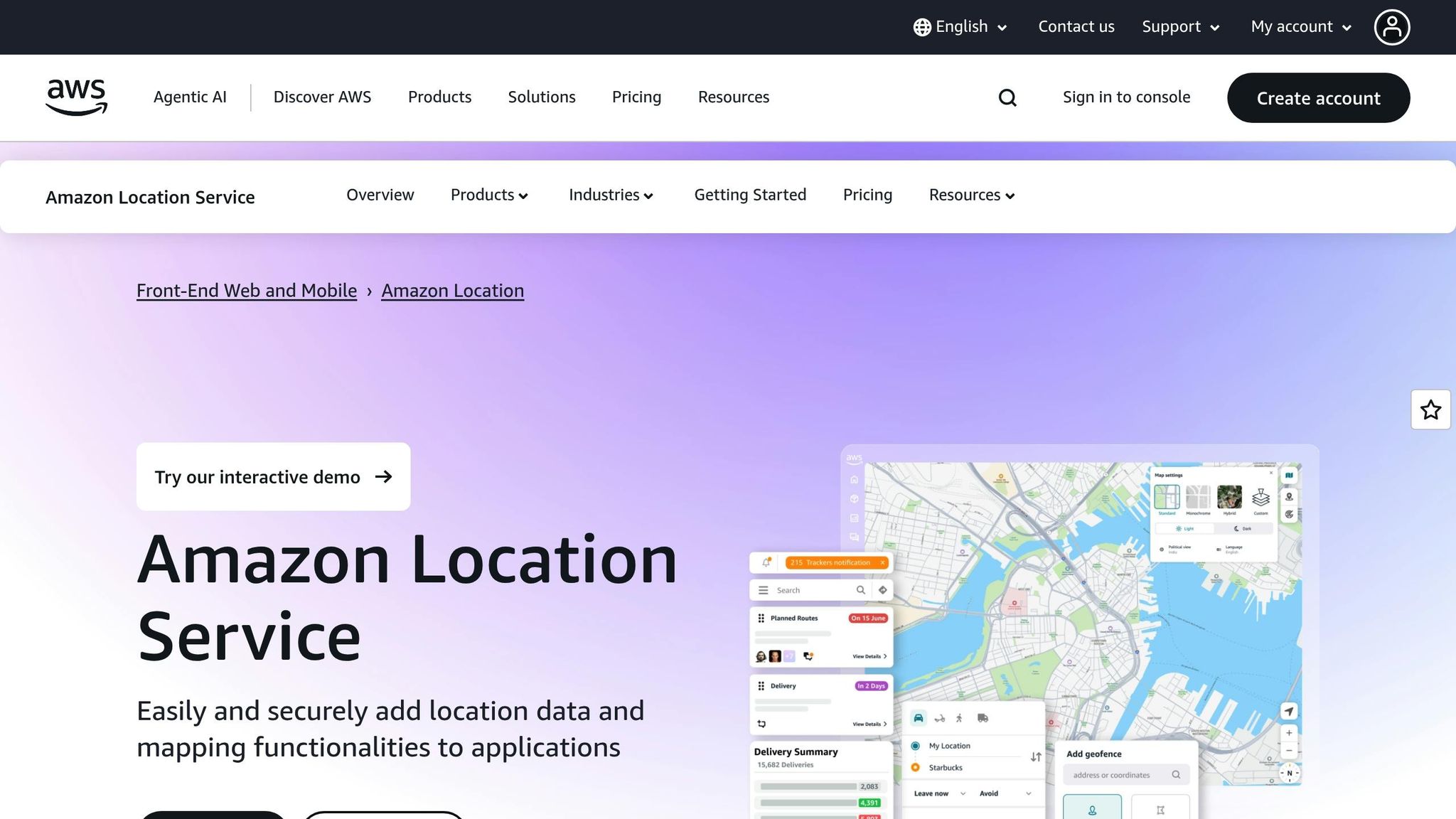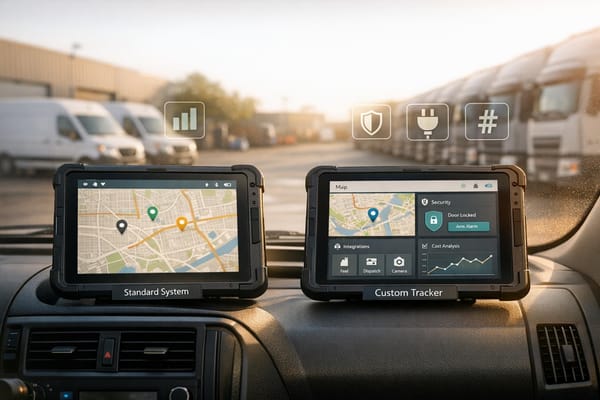How APIs Enable Real-Time Fleet Tracking
Explore how APIs are revolutionising fleet management with real-time tracking, cost savings, and enhanced security for UK businesses.

APIs (Application Programming Interfaces) are transforming fleet management by enabling real-time tracking, improving efficiency, and reducing costs for UK businesses. Here's how they work and why they matter:
- Real-Time Tracking: APIs connect GPS devices with fleet management systems, providing live updates on vehicle locations, fuel usage, and driver behaviour.
- Cost Savings: Businesses optimise routes, reduce fuel consumption, and lower maintenance expenses by using real-time data.
- Improved Security: Features like geofencing, dual-trackers, and remote immobilisation help protect vehicles and recover stolen assets.
- Automation: APIs eliminate manual processes, sending automated alerts for maintenance, route changes, and driver performance updates.
- Enhanced Customer Experience: Real-time shipment updates and accurate ETAs improve transparency and trust.
APIs are the backbone of modern fleet management, allowing businesses to make smarter decisions, improve operations, and stay competitive in a challenging market.
AWS Location Services Tutorial | Fleet Tracking System Design | Logistics IoT

How APIs Enable Real-Time Data Flow
Real-time fleet tracking depends on the smooth movement of data between vehicles and management systems. APIs act as the digital bridges that ensure information is collected, processed, and delivered efficiently. Let’s break down how data flows, from collection to mapping integrations, to create actionable insights.
How Data Is Collected and Transferred
Fleet data starts its journey with onboard tracking devices installed in vehicles. These devices monitor critical metrics like vehicle status, location, and performance. The data is then transmitted using cellular networks or satellite connections to cloud servers. Here, APIs step in to standardise and format the data so fleet management software can interpret it, regardless of the device manufacturer. Once processed, the information is displayed on web dashboards and mobile apps, offering near real-time updates for fleet managers.
Types of Data Captured Through APIs
Fleet tracking APIs gather a wide range of information, all crucial for running an efficient fleet. Here’s what they monitor:
- Location Data: GPS coordinates, speed, and travel direction.
- Fuel Metrics: Insights into fuel usage and efficiency.
- Maintenance Data: Indicators that signal when a vehicle needs servicing.
- Driver Behaviour: Data to track and encourage safer driving practices.
This wealth of information allows fleet managers to make smarter decisions about operations, maintenance schedules, and safety measures.
Mapping Integration for Better Location Tracking
Mapping APIs add value to raw location data by integrating with platforms like Google Maps or Ordnance Survey. These integrations allow fleet management systems to display vehicle positions on detailed maps and access real-time traffic updates. In the UK, where urban congestion is a frequent issue, these tools are especially helpful for suggesting alternative routes and improving overall efficiency. Geofencing features take it further by letting managers set virtual boundaries around specific areas. Notifications are triggered whenever a vehicle enters or exits these zones, enhancing route planning and security measures even more effectively.
Benefits of API Integration in Fleet Management
API integration takes fleet management to the next level by transforming it into a proactive, data-focused operation. The advantages go far beyond simple vehicle tracking, delivering noticeable improvements in efficiency, security, and overall performance - all of which have a direct impact on profitability.
Automation and Efficiency
APIs streamline fleet operations by eliminating time-consuming manual processes. They automatically collect real-time data, send maintenance alerts based on mileage, engine hours, or diagnostic codes, and optimise dispatching processes.
For example, in dispatch operations, APIs can instantly locate the nearest available vehicle, calculate the most efficient route, and send directions directly to the driver’s device. What used to take minutes or even hours now happens in seconds, saving valuable time.
Automated reporting is another major advantage. Instead of manually gathering data from multiple sources, fleet managers receive regular, automated updates on key metrics like fuel consumption, driver performance, and vehicle usage. These reports provide actionable insights, helping managers identify areas where costs can be reduced.
This level of automation not only improves efficiency but also lays the groundwork for stronger security measures.
Better Security and Theft Prevention
API integration also strengthens vehicle security. Anti-theft systems, powered by APIs, are seamlessly integrated into fleet operations. For instance, dual-tracker technology is a standout example. A primary tracker continuously monitors the vehicle’s location, while a secondary Bluetooth-enabled device acts as a backup if the main tracker is disabled. APIs ensure these systems communicate effectively, automatically switching between trackers when needed.
Remote immobilisation is another powerful feature enabled by APIs. This allows fleet managers to disable a vehicle remotely if theft is detected. These systems can distinguish between authorised and unauthorised use, ensuring a quick response to genuine threats. GRS Fleet Telematics has demonstrated the effectiveness of this approach, achieving a 91% recovery rate for stolen vehicles by coordinating tracking devices with recovery teams.
Geofencing alerts add an extra layer of security. If a vehicle leaves a designated area during off-hours, APIs immediately notify fleet managers and security teams. This rapid response increases the likelihood of recovering stolen vehicles and minimises potential losses.
Improved Fleet Operations
APIs don’t just improve efficiency and security - they also enhance the overall management of fleet operations. By connecting various systems, APIs provide fleet managers with a unified view of performance, allowing for smarter decision-making.
Route optimisation is one area where APIs shine. They continuously analyse traffic conditions, delivery schedules, and vehicle locations to suggest the best routes, saving time and fuel.
Fuel management also benefits from API integration. By combining GPS and engine data, APIs can identify inefficient driving habits, excessive idling, and ideal refuelling opportunities, helping reduce fuel costs.
Driver performance monitoring is another key feature. APIs track behaviours like speeding, harsh braking, rapid acceleration, and sharp cornering. This data supports targeted coaching programmes, which can lower accident rates and reduce vehicle wear and tear.
Maintenance planning becomes more predictive with APIs. By monitoring engine diagnostics, mileage, and usage patterns, APIs can forecast when parts are likely to need attention. This proactive approach reduces unexpected breakdowns and extends the lifespan of vehicles.
API-integrated solutions are also highly affordable. With subscription plans starting at just £7.99 per vehicle per month, businesses of all sizes in the UK can access advanced fleet management tools that were once only available to large corporations. This combination of affordability and measurable benefits makes API integration a practical choice for any fleet operation.
Challenges and Security in API Integration
API integration brings a host of benefits to fleet tracking, but it’s not without its hurdles. Businesses must navigate these challenges to ensure operations remain seamless and secure.
Common Challenges in API Integration
One major obstacle is system compatibility. Many UK businesses still rely on older fleet management software that wasn’t built to integrate with today’s APIs. These legacy systems often use outdated data formats or communication protocols, making integration a complex task that may even require custom development.
Another issue is data reliability, especially when dealing with real-time tracking. APIs need to process continuous data streams from multiple vehicles, but network connectivity problems - particularly in rural parts of the UK - can lead to data gaps. These interruptions can undermine the accuracy of fleet monitoring and affect decision-making.
The complexity of real-time deployment adds another layer of difficulty. Unlike batch systems, real-time APIs require constant uptime and the ability to respond instantly. This means the infrastructure must be robust enough to handle sudden spikes in activity, such as during peak delivery times or emergency situations involving multiple vehicles.
Staff training and adoption also pose challenges. Fleet managers and drivers need to get comfortable with API-driven systems, which often differ significantly from traditional tracking tools. This adjustment period can temporarily impact efficiency as teams learn to navigate new workflows and interfaces.
Lastly, cost management is a key concern. While basic API integrations might seem affordable initially, scaling up - whether through additional features, increased data usage, or larger fleet sizes - can strain budgets. Businesses need to understand the full cost structure, including potential overage charges for data usage, to avoid unpleasant surprises.
Tackling these challenges effectively is a crucial step before turning attention to data security.
Data Security and Privacy Considerations
Once technical and operational hurdles are addressed, the focus shifts to securing sensitive data. Fleet tracking APIs handle vast amounts of personal information, and UK Data Protection Laws require strict compliance when processing data like vehicle locations, driver details, driving behaviour, and route logs. Establishing a lawful basis for processing this information is essential, with most operators relying on "legitimate interests" or legal obligations rather than employee consent.
A clearly defined Vehicle Tracking Policy ensures data is handled lawfully, fairly, and transparently. Meanwhile, multi-factor authentication (MFA) adds a critical layer of security. Research shows MFA can prevent 99.9% of account compromises, a vital measure given that 81% of data breaches stem from compromised passwords.
Encryption is another cornerstone of data security. Whether data is in transit or stored, encryption protocols protect it from unauthorised access. Robust authentication methods like OAuth, JWT (JSON Web Tokens), or OpenID Connect ensure only authorised users and systems can access fleet data. Additionally, role-based access control (RBAC) enforces the principle of least privilege, limiting access based on user responsibilities.
Ignoring security can be costly. The average global cost of a data breach is projected to hit $4.45 million in 2024, and 60% of small businesses fail within six months of a cyberattack. For fleet operators, investing in API security is not just a precaution - it’s an essential safeguard for the business.
Using APIs for Advanced Security Features
APIs also unlock advanced security capabilities that go beyond basic tracking. For example, remote vehicle control allows managers to take immediate action during theft or unauthorised use. Through API commands, they can lock or unlock vehicles, disable engines, or activate alarms - all from any location with internet access.
Geofencing integration is another powerful tool. APIs can create virtual boundaries around specific areas, triggering instant alerts when vehicles enter or leave these zones. This feature is invaluable for monitoring high-risk locations or ensuring vehicles stay within approved areas during designated hours.
APIs also enable real-time threat detection. By analysing driving patterns, they can flag unusual activity, such as significant route deviations or operating outside scheduled hours. When anomalies are detected, APIs can alert security teams and initiate tracking protocols immediately.
Finally, integration with recovery services enhances theft response. APIs can automatically share vehicle location data with police and recovery teams, speeding up the process and improving the chances of recovery.
These advanced features make sophisticated security measures accessible to businesses of all sizes across the UK. Even smaller fleet operators can now leverage technology that was once reserved for large corporations, levelling the playing field in the realm of fleet security.
Practical Use Cases: API-Driven Fleet Tracking
API-driven fleet tracking is transforming fleet operations across the UK, offering tangible benefits in delivery efficiency, security, and cost management.
Delivery Tracking and Driver Monitoring
The demand for same-day deliveries in the UK has surged, making real-time delivery tracking and driver monitoring essential. APIs play a pivotal role in meeting these needs by enabling dynamic systems that adapt to changing conditions.
For example, APIs can adjust routes in real-time based on traffic or weather updates. They also monitor driver behaviour, tracking metrics like speed, harsh braking, rapid acceleration, and idle times. These insights help maintain safety standards and cut costs. In fact, UK companies using such systems saw their accident costs drop by an average of 28% in 2024.
Take Skroutz as a case in point: after integrating API technology, they improved on-time delivery reliability from 93% to 98.5% and increased driver productivity by 10%.
APIs also enhance customer experience by offering accurate delivery windows and real-time updates. This ensures customers are promptly informed of any delays, building trust and satisfaction. But APIs go beyond delivery optimisation - they also bolster fleet security.
Theft Recovery and Asset Security
API-driven systems don’t just improve efficiency; they also provide critical tools for asset protection. With vehicle theft posing a major risk to UK businesses, API-integrated security features have become indispensable.
One standout example is dual-tracker technology. By coordinating two tracking systems, APIs ensure a backup is in place if the primary tracker is compromised. GRS Fleet Telematics, which uses this approach, reports a 91% recovery rate for stolen vehicles - highlighting the effectiveness of API-based solutions.
APIs can also trigger immediate responses to theft. If unauthorised movement is detected, the system alerts security teams, notifies the police, and begins tracking the vehicle. This automated process significantly improves recovery rates compared to manual reporting.
Geofencing, another API-enabled feature, creates virtual boundaries around secure areas. If a vehicle leaves its designated zone outside of approved hours, the system sends instant alerts. Fleet managers can even remotely immobilise stolen vehicles, preventing further movement and aiding recovery efforts.
Cost Reduction Through Better Planning
API-driven fleet management is not just about efficiency - it’s also a game-changer for cost savings. By improving planning and resource allocation, UK businesses have achieved measurable reductions in operational expenses.
Fuel costs are a prime example. Companies using these systems in 2024 reduced fuel expenses by an average of 24%, a notable improvement compared to the previous year. GPS tracking users alone cut fuel costs by 16%.
APIs also streamline route planning. For instance, one solution can process 4,000 orders in just 8 minutes, reducing what used to take hours to mere minutes. The financial impact is clear: in 2024, a global fashion retailer used a route optimisation API to cut delivery costs by 46% while speeding up deliveries and boosting customer satisfaction. Over five years, a leading furniture retailer saved $80 million in delivery expenses by adopting similar tools.
Maintenance costs are another area of savings. APIs analyse vehicle usage and maintenance history to schedule servicing at optimal times, helping UK companies cut maintenance expenses by an average of 21% in 2024.
Labour costs also see reductions. By coordinating driver schedules with route planning, APIs ensure workloads are evenly distributed while adhering to driving time regulations. This approach helped British companies lower labour costs by 22% in 2024.
Improved safety and theft prevention naturally lead to lower insurance premiums. Businesses using GPS tracking saw a 13% drop in their insurance costs, reflecting a reduced risk profile.
Conclusion: The Future of Fleet Management with APIs
APIs are reshaping fleet management across the UK, offering better security, improved efficiency, and tighter cost control.
For UK businesses, API-powered solutions have redefined fleet operations, delivering measurable improvements in performance and day-to-day management. Take, for instance, API-enabled tracking systems - they’ve significantly boosted recovery rates, giving fleet managers a stronger grip on their assets.
But it’s not just about security. APIs bring operational benefits that go far beyond traditional methods. They enable real-time route adjustments based on traffic or weather conditions and provide detailed insights into driver behaviour and vehicle performance. These capabilities make fleets more agile and efficient.
A great example of this is GRS Fleet Telematics. Their dual-tracker technology, integrated with advanced APIs, offers real-time monitoring at a price point that works for businesses of all sizes - starting at just £7.99 per month. This demonstrates that cutting-edge fleet tracking doesn’t have to break the bank, making it accessible to everyone.
As API integration continues to evolve, what was once seen as a complicated, high-cost solution is now becoming standard for progressive UK businesses. The question is no longer if APIs should be adopted but how quickly they can be implemented to unlock these advantages.
API-driven fleet tracking has proven to be both effective and profitable, making real-time fleet management a reality. The future of fleet management is here, and it’s powered by APIs.
FAQs
How do APIs improve the security of fleet vehicles beyond basic tracking?
The Role of APIs in Strengthening Fleet Vehicle Security
APIs are key to improving fleet vehicle security, offering capabilities that go far beyond basic tracking. One of their standout features is the support for secure authentication methods like OAuth, which ensures that only authorised individuals can access sensitive vehicle information. This adds a strong layer of protection against unauthorised access.
Another critical function of APIs is the ability to encrypt data both during transmission and while it's stored. This safeguards the information from potential breaches, keeping it secure at all times. On top of that, APIs enable real-time monitoring and instant security alerts. These features empower fleet managers to act quickly in response to potential threats, enhancing overall vehicle safety.
By integrating secure authentication, data encryption, and real-time alerts, APIs deliver a multi-layered security approach. This not only boosts protection but also provides businesses with greater confidence in the safety of their fleets.
What challenges do businesses face when integrating APIs for fleet management, and how can they overcome them?
Integrating APIs into fleet management systems comes with its fair share of challenges. One major hurdle is data inconsistency - different systems often handle data in varying formats, making integration tricky and increasing the effort required for maintenance. On top of that, data security is a pressing concern, as sensitive fleet information must be safeguarded against potential breaches.
To tackle these issues, it's wise for businesses to collaborate with providers offering secure and dependable API solutions. Choosing options that allow for customisation can help ensure smooth compatibility with existing systems. Additionally, sticking to consistent API standards can minimise errors and make ongoing maintenance more straightforward. These steps can help businesses integrate APIs into their fleet operations more efficiently and securely.
How do APIs help improve route planning and fuel efficiency in fleet management?
APIs provide instant access to key data like traffic updates, weather conditions, and road closures. With this real-time information, fleet managers can adjust routes on the fly, helping drivers avoid delays and find the most efficient paths.
Better route planning means cutting down on extra miles, using less fuel, and making the most out of each vehicle. The payoff? Lower running costs, a smaller carbon footprint, and more streamlined fleet operations.




